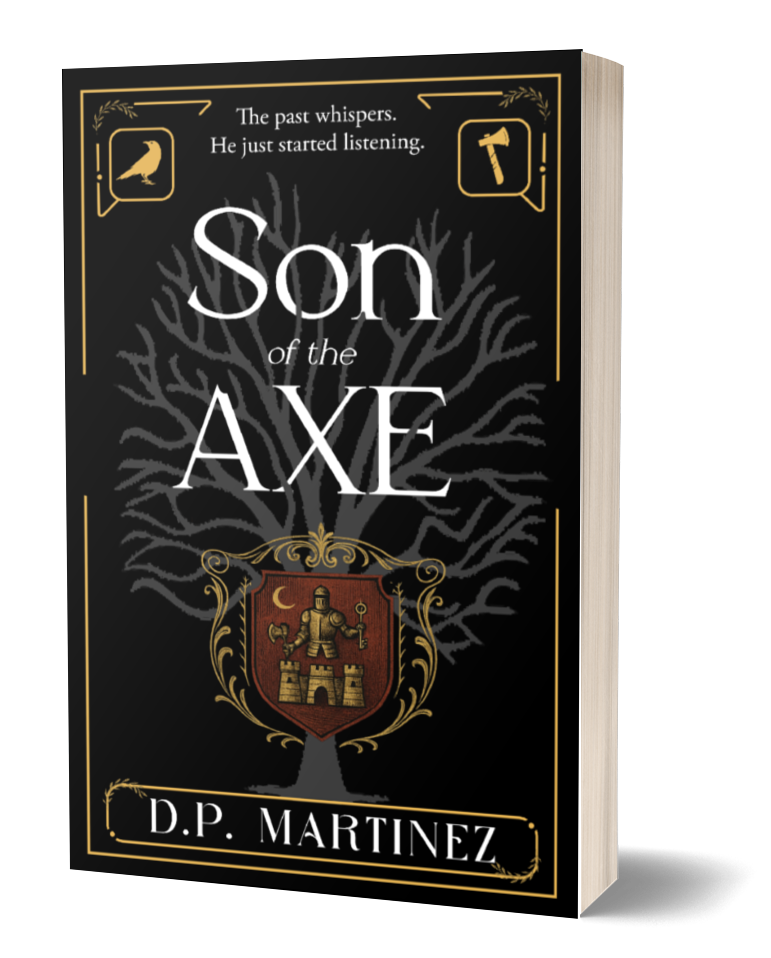Son of the Axe
Step into this haunting and richly imagined debut.
A magical realism novel about family legacy, genealogy, forgotten history, and the weight of the stories we inherit.
Perfect for readers of The Invisible Life of Addie La Rue and The Midnight Library.
AVAILABLE NOW!

About son of the axe
Jacob Machado’s life looks perfect on the outside—steady job, loving wife, close friends—but something is missing.
When he acquires a cursed twelfth-century axe once wielded by an ancestor, he’s pulled into a haunting search for identity and legacy.
As visions blur past and present, Jacob must choose: break the curse and lose his connection to history, or complete the oath and risk losing himself.
But some legacies don’t want to be buried.
Son of the Axe is a captivating mix of genealogy and magic that had me hooked from start to finish. As someone passionate about family history and a genealogy researcher, I immediately connected with Jacob’s journey and the addictive pull of tracing one’s roots.
DP Martinez perfectly conveys the mix of anxiety and excitement that comes with piecing together family history. Every breakthrough Jacob experiences mirrors the emotional highs familiar to any genealogist, making his story feel both personal and relatable. The pacing is thrilling, alternating between suspenseful revelations and magical experiences that keep you eagerly turning pages.
This will be lots of fun for all lovers of fantasy where the past and present intermingle, and Game of Thrones-inflected style meets contemporary magical mystery which is rooted in precise observations of life today.
The narrative is compelling, the characters engaging and I thoroughly enjoyed it! Looking forward to the next one!
Son of Axe is a surprising human tale that interweaves historical retelling and magical realism, with a modern story of a family struggling to find their place in life. It takes place across London, Portugal, and Colombia, leading the reader on a journey that begins with domestic uncertainty, but then catches you out with a moment of fantasy (enter the Axe) that takes the protagonists to some dark, but also some very uplifting places.
You’ll find yourself rooting for the characters as their lives are turned upside down on several occasions, but all the time guessing how the Axe is going to help or hinder them in their quest to remain strong together.
If you like stories of families surviving against the odds, you’ll like this. If you like your fantasy to have a very human grounding, you’ll love this.
free chapter
Chapter 1
Portugal, 1190
The axe. I need the axe.
So many wounded, so many dead. The clatter of swords, the death screams, the thumping of boots, and the neighing of horses ascend into a shrilling cacophony.
Why is it so hard to breathe, damn it? I see no smoke, no fire in this dreadful night—only the king, my lord, my father, battling the Moors in the fields outside the city gates. Agh, retreating.
I’ve lost my weapon, the one the brutish soldiers mock me about day after day. ‘Go fetch us some wood for the bonfire with that thing,’ or ‘Are you planning to fight or build your coffin?’ I let their guffaws dwindle and extract myself to sharpen the blade.
Santo Deus! It’s so hard to breathe. Where did I leave it?
I retrace my steps, avoiding the thick of the battle, to the spot where I fell last, pushed by a friendly veteran. ‘Get out of the way, king’s bastard,’ he said as I stumbled. My army may take issue with my untrained presence, but the enemy doesn’t care that I’m just a boy of sixteen. They would kill me at the first chance, the same as anyone. I may not know how to wield a sword to behead a man, but I know how to fell a cork oak, a larger foe than any of the soldiers in the enemy’s ranks (albeit one that never fights back).
A pile of bodies drenches the ground with dark blood and, in its midst, a familiar form.
I pick up the dripping axe and wipe the blade on my leg. Mud and blood stain my pants, a proper analogy for my lineage. My father, King Sancho I, knows very well how to spread his seed as most kings do, despite being only the second monarch of the Kingdom of Portugal. Six heirs he bestowed to the sweet queen, and three to my mother, his noble concubine. The princes are but rapazes, so the king called upon me to fight by his side, hoping to make a warrior out of this builder—but my eyes are not set on military ranks or majestic cathedrals. ‘You are destined for greatness,’ my mother said as I bid farewell to her no more than twelve days ago. ‘Show the king your worth; make him believe.’
She stared into my eyes and pressed my hands in hers as she said this. She tarried there, waiting for my response, reading my face, but I struggled to form a reply to such a weighty and vague command. I was raised to be diligent and obedient, which I later discovered is useful to please army captains but not necessarily to stand out in battle. Proving myself in war and obtaining the king’s approval and the respect of my peers required courage I had only heard in tales and songs of warriors of old. Perhaps pretending to be one of those heroes, as I did in childhood, could help. So I summoned the epic verses of courageous deeds and placed my name, Martín, in them, singing the songs in my mind as my mother’s longing eyes almost faltered. ‘I will, mãe.’
In the days since my departure, I’ve continued the pretension, even imagining the campfire stories (the heroic ones, of course) told every night were about me. It was all contrived, though, because if it’s true that dreams reveal what’s in one’s soul, then mine was far from becoming a champion. In those dreams, I’m a coward, a deserter.
The beat of drums joins the battle sounds from within the fortified city, dragging my heartbeat to follow their rhythm, and fear grips my throat. Drunken stories have it that the infidels release monstrous warriors at the beat of their drums, men so strong that they dismember whoever crosses their path using their bare hands. I’ve seen them a dozen times in my sleep, heard the drumming and the crack of bones. Only this time it is for real. Or is it? Am I dreaming? Am I imagining the terrors before me, or is this my baptism in the Crusades?
A sharp pain in my left arm brings sudden clarity. This is no dream. An arrow sticks out of my forearm on both sides. The pain is like no other I’ve felt before. Sharp waves of agony radiate from the wound as my heart beats to the rhythm of the drums, tearing, burning my skin. I let out a scream that is heard nowhere but in my head. The world narrows to this moment, here and now, overwhelming my senses, instinctively bringing me to my knees.
It lasts only a few seconds, however, as the sound of arrows piercing the air wakes me to the nearness of death. I throw myself behind the pile of bodies and try to reach for the arrow, but the weight of the axe in my right hand is too much. I can’t let it go. I can’t lose my axe again. I can’t let my mother down. I can’t fail in proving my worth to the king.
Every breath is painful, but it must be in my head, as only my arm is injured. I feel the handle of my axe, cold and sticky, but full of certainty—it has never let me down, always striking where it must, breaking wood, following my will.
With my back against the already dead and my gaze upon the dying (yes, men fall left and right, arrows piercing eyes and hearts), I have a new epic vision, a new song worthy of a wandering bard; no, worthy of the halls of the king. And so I rise, numb to the pain in my arm, empowered by the axe in my hand, and charge towards the city gate, pushing or avoiding the living and jumping over the dead. An enemy steps in front of me, holding a scimitar above his head, about to strike, and I hear the song in me:
With a roar like thunder, the battle began,
The scimitar flashed, swift as the wind, it ran,
But the axe came down with a mighty force,
A clash of titans, altering the course.
A few steps later comes another Moor, but my song does not stop.
Oh, hear the song of the axe and the blade,
Of the clash of steel and the heroes made,
In the dance of war, where the fates collide,
The soldier stands strong with bravery and pride.
The song grows louder as I smite enemies with my short blade and my king’s army gathers around me with renewed hope.
Through the dust and fury, the soldier pressed on,
His axe met the blade, in the break of dawn,
The scimitar faltered, its strength undone,
By the will of the axe, the victory won.
At last, I reach the gate, firmly shut, but not for long. The battle sounds fade away; no drums, no screams, no arrows whizzing by. Just a wooden gate and my axe.
A pummelling breeze slaps my face, and it is as though I’m standing alone in the woods, like so many times, in front of a mighty tree, caressing its trunk, feeling the ruggedness of its bark, the life in it ready for sacrifice.
I swing the axe hard. Splinters fly off the gate. I hit again and again, protected by the men who mocked me just this morning. The gate gives way, piece by piece, and I can see through as men inside the city scurry away in panic. No one fights back or tries to stop me.
My right arm begins to shake in spasms from the effort, but my left arm is still pierced, brandishing the arrow as a medal, hanging useless. My mother’s command and the song keep me going, keep me smashing the gate with the axe. And like a stubborn oak that demands extra blows, the gate of the city of Torres Novas taunts me with its force. Weakness takes hold of my sweaty body, a chill runs down my spine, and I gasp for air.
‘Aaarrrrgh!’ With one last blow, the gate splits in half.
White light blurs my vision, and I don’t see what happens next—but I can hear the cheers of victory as the king’s army takes over the city.
Would you follow your roots if they led you somewhere you couldn’t return from?
About the author.

D.P. Martinez is a contemporary fantasy author specialising in urban fantasy and magical realism.
He holds an M.A. in English Literature from the University of Greenwich, where he focused on Literary London.
His research explored metaphorical representations of London in urban fantasy.
He has written hundreds of articles and several books across both fiction and non-fiction.
D.P. Martinez





